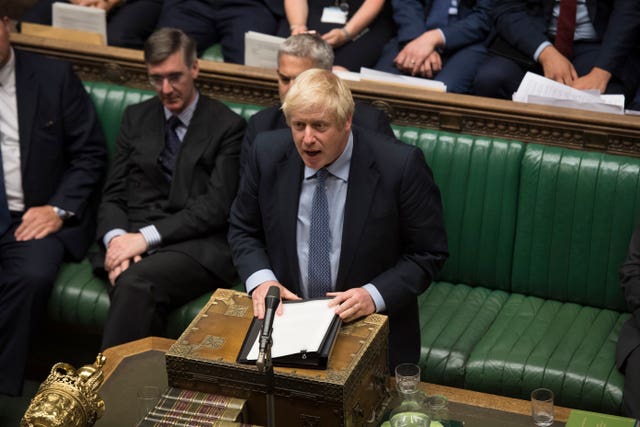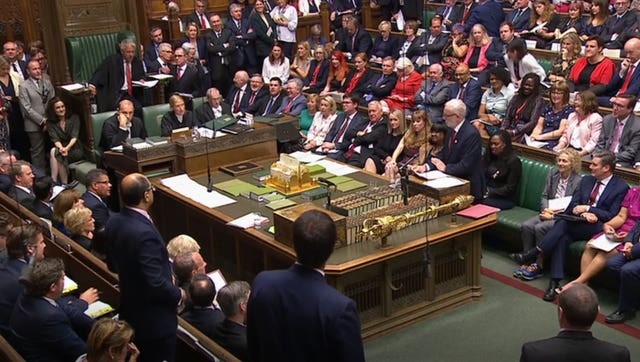Why the next election is ‘fixed’ for 2022 but could be held next month
Boris Johnson wants to bring forward the date of the election but opposition MPs are not yet playing ball.

The Prime Minister had insisted he definitely did not want one but now he has changed his mind.
Labour leader Jeremy Corbyn has constantly talked of wanting one, but he too has tempered his position.
And Brenda from Bristol, who famously complained ‘not another one’ in 2017, is unlikely to want one any time soon.
So when will the next general election be?
Here are some estimates.
– Don’t we have to wait until 2022?

Cast your minds back to 2011. Ah yes, the heady days of the coalition after that love-in in the Downing Street Rose Garden.
It all feels like a long time ago now but that was when the Fixed-term Parliaments Act (FTPA) was born, setting out that a general election should occur every five years (we will get into the caveats later), rather than leave the date to the whim of the prime minister.
Given that former prime minister Theresa May called a snap election in 2017 – exercising a get-out clause in the above Act – that would mean the next election would be in 2022.
– What is all this talk of holding one in October then?
There are loopholes to the five-year election rule. Should a no-confidence motion in either the government or the prime minister carry, then, if no other party can command a majority within the following 14 days, a general election can be called.
And less drastic than that, if two-thirds of MPs – 434 of them – agree to hold a general election before the five years is up then Parliament can be dissolved. That is how Mrs May banked her snap poll two years ago and Prime Minister Boris Johnson wants to do the same now.

Downing Street briefed journalists last week that, should opposition parties succeed in using legislation to effectively take a no-deal Brexit off the table (an outcome that is looking likely), then Mr Johnson would be calling on MPs to vote for an election on October 14.
This was later pushed back by a day to October 15, after Jewish communities complained that it clashed with the festival of Sukkot, meaning Orthodox Jews would not be able to vote.
If an election does take place on Tuesday October 15, it would be the first time an election has not been held on a Thursday, the traditional day for British polls, since 1931.
– Why has October 15 been chosen for a general election?
With a European Council summit scheduled for October 17, Number 10 wants to hold an election beforehand in order to give the PM the opportunity to win a fresh majority and show European Union leaders he could get any prospective deal through Parliament.
A Commons majority would also allow the Conservative Party leader, should the UK and Brussels not come to an agreement, to take Britain out of the EU without a deal by deadline day on October 31.
– Jeremy Corbyn is always saying he wants a general election so everyone is agreed, right?
Not so fast. The looming prospect of a no-deal Brexit has tempered the desire of the opposition leader and his party for a general election – something they have been calling for consistently for the past 12 months.
Instead, Mr Corbyn wants to see the legislation currently making its way through Parliament – a Bill that would force the PM to ask the EU for a three-month delay if he cannot secure a deal by Halloween – before whipping his MPs to back a general election.

The legislation gives Mr Johnson until October 19 to strike a deal or else he would be legally bound to write to European leaders asking for the extension to Article 50.
The PM asked MPs on Wednesday to vote for a general election but Labour abstained, while the Liberal Democrats voted against.
Mr Corbyn, speaking after the result was declared, told Mr Johnson: “Let this Bill pass, and gain Royal Assent, then we will back an election so we do not crash out with a no-deal exit from the European Union.”
– What date might we have a general election then?
The leaders of both major parties, along with the SNP and Liberal Democrats, say they want a general election but Labour is not willing to give Mr Johnson the October 15 date he wants.
While a fresh poll in the autumn looks likely given the Commons stalemate, the final date will depend on how long the opposition want to keep the PM in suspense.
Mr Johnson will use a speech on Thursday to paint Mr Corbyn as “not only blocking Brexit but now also stopping the people having their say by refusing a general election”.
But without a majority in the Commons – the PM lost his after Dr Philip Lee defected to the Lib Dems and 21 other Tory MPs were sacked for voting against the Government on Tuesday – Mr Johnson is beholden to the opposition.
If he had a majority he could in theory introduce a new act overturning the FTPA.
But he hasn’t. And that would take time anyway even if he had.
So he has to wait for those opposite him to either vote by a two-thirds majority for an election or vote no confidence in him or the Government as a whole.
The PM has already set into motion plans to prorogue Parliament next week and hold a Queen’s Speech on October 14.
The opposition could wait until then before agreeing to an election
in a move some might regard as embarrassing for Mr Johnson.
Inviting the 93-year-old monarch to set out his Government’s plans for office only hours before dissolving Parliament for a general election might not be a good look for a new PM.
It would also mean he would miss his deadline of taking Britain out of the EU by October 31.





